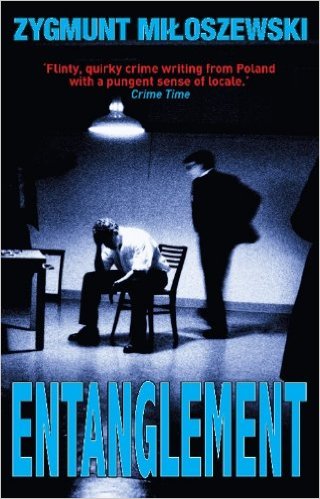This in a police procedural in a series following the investigations of Polish State Prosecutor Teo Szacki. In Poland, according to this novel, the prosecutor does the investigating, and not the police whose domain includes the heavy lifting and car chasing. The locale is Warsaw with its nouveau riche and old communists side by side. It is part of series.

A middle aged man in mid-career is found dead in a church, a shish-kabob skewer stuck through his eye. He was participating in a role-playing therapy group using rooms in the church. Between sessions he was murdered. Did someone take the role playing too seriously! Was there an intruder? Did the victim have an enemy who followed him there? Did he — somehow — commit suicide with that skewer?
Most of the role-playing was videoed and much of the early going is Szacki watching it with the therapist who explains the proceedings, while more than once, Szacki thinks about his own life and his own need for…something, perhaps even therapy. The theoretical explanation of the procedure seems incredible [no spoiler] but it hangs together (and adds to the mystery, which is often lacking in krimis.) In addition, the victim also recorded some of his musings on a pocket recorder, and these, when discovered, add to the incredibility of it all, because he seems at one point to be talking to a ghost.
The more Szacki digs, the more confusing and paranormal it seems to become. This mystery is not welcome to a man who lives on and for facts.
Warsaw is new to me and I enjoyed the to’ing and fro’ing around the city in the summer rain. The banter between colleagues in the prosecutor’s office, the lack of a budget for even basic tests, the vulture journalists looking for blood, the boom-and-bust all at once nature of contemporary Poland while the rich get richer and the poor get poorer, and the role-playing therapy, these are all well handled and add layers to the narrative texture.
 Zygmunt Miloszewski
Zygmunt Miloszewski
There is a plot wobble for this reader. Szacki seeks a second professional opinion on the therapy session and that confirms the procedure, but later…. Well, no spoiler but the curve disappointed this reader.
While the author distinguishes the characters, as always with such unfamiliar names, I found keeping the names and the individuals straight difficult. Though I consumed those dark, depressing, and dispiriting Russian novels that were de rigueur in college, I could never keep the names straight then either.
The translation and presentation on the Kindle are good. The production is far better than for the other Polish krimi I recently discussed, ‘Polychrome.’
Skip to content
